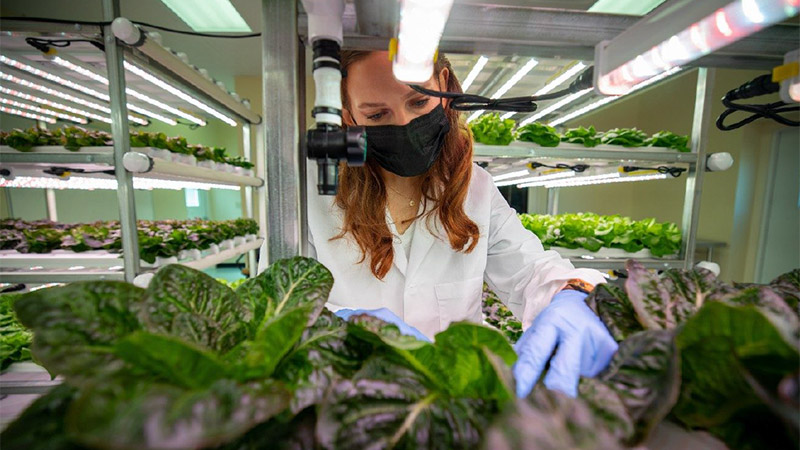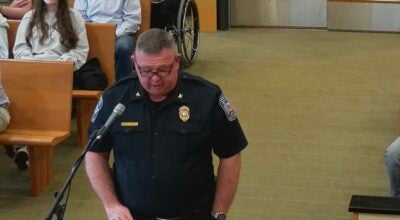Robots are coming to the farm
Published 6:00 am Wednesday, May 26, 2021

- The Center for Advanced Innovation in Agriculture is a catalyst for research that spans disciplines in order to advance technologies and enhance decisions for expanding agricultural and food systems. At the Controlled Environment Agriculture Innovation Center on the Institute for Advanced Learning and Research’s campus in Danville, Samantha Smith-Herndon inspects greens that have been grown using a nutrient film technique hydroponic system.
|
Getting your Trinity Audio player ready...
|
A four-wheeled robot roams the diverse terrain of a cow pasture as a drone flies overhead the herd, providing almost real-time modeling and analysis of the robot.
Using the data provided from the drone and animal and environmental sensors, the robot performs management tasks, demonstrating the capabilities of an integrated suite of technologies to monitor pollutant hotspots, soil and water characteristics and cattle movement in pastures.
“The goal of this research is to build a suite of affordable, small-scale technologies for use on small- and medium-sized livestock operations to facilitate meaningful improvements in rural land management and agricultural water quality, and ultimately a more resilient agricultural landscape,” said Zach Easton, a professor of biological systems engineering, Virginia Cooperative Extension specialist and principal investigator of the project.
Through the improved capacity to study and understand the relationship between cattle, soil, forage and water in pasture systems, the research can help design management practices to minimize runoff of harmful pollutants into sensitive waterways.
Easton’s grant was one of 32 that the College of Agriculture and Life Sciences recently awarded to researchers around the college who are examining everything from robotics to pheromone sampling. The seed grant program supports the priorities of the 2020 CALS strategic plan. Twenty-seven of the grants were awarded to affiliated faculty in the Center for Advanced Innovation in Agriculture (CAIA).
The recently formed center in the college is a catalyst for research that spans disciplines in order to advance technologies and enhance decisions for expanding agricultural and food systems. CAIA-affiliated projects are composed of teams across agriculture and life sciences academic units as well as data analytics and engineering, including faculty from other colleges, to tackle the big challenges and future opportunities in agriculture and food systems. The center will help cement Virginia Tech’s role as a comprehensive and innovative global research leader in smart and secure agriculture technologies and data analytics for informed decisions.
“The ‘Eyes in the Sky and Boots on the Ground’ project is an example of developing the internet of things applications to agriculture. By funding these innovative research projects, the center is fulfilling its goal to create an agile and responsive network of interdisciplinary researchers, transdisciplinary teams and Virginia Cooperative Extension specialists who are charting the course for the future of agriculture,” said Susan Duncan, the center’s director and the associate director of Virginia Agricultural Experiment Station.
Song Li, an associate professor in the School of Plant and Environmental Sciences and affiliated faculty member of the center, is using the grant the college awarded him to study how machine learning can assess specialty crop health and quality.
Specialty crops have higher profit margins than traditional row crops and are a vital economic crop for Virginia and nearby regions. These crops are also well-suited to smaller-scale farms.
Through this research, Li and his team aim to develop new machine learning models that can be used by producers. The final product of this research is a portable device that includes a mobile phone application, a spectral filtering lens and a miniature microscope that can be fitted onto a cell phone to collect data and make decisions automatically in the field. This example of artificial intelligence development for agriculture exemplifies opportunities for influencing agricultural decisions and driving the bioeconomy.
Another of the funded projects, “Using imaging for animal health and management,” focuses on the early detection of mastitis, an intramammary gland infection in dairy cattle, and has well-recognized detrimental effects on animal wellbeing and dairy farm profitability.
Early detection of both mastitis and pregnancy establishment allows dairy farmers to intervene quickly, provide health care and implement management strategies to ensure maximum animal wellbeing and productivity.
“Our multidisciplinary and innovative research explores noninvasive and automated systems that can leverage hyperspectral imaging, robotics and machine learning to detect and diagnose the early onset of subclinical and clinical mastitis and pregnancy establishment in dairy cattle,” said Vitor Mercadante, an assistant professor in the Department of Animal and Poultry Sciences, Extension specialist, and principal investigator of the project.
Mercadante and his team will develop a robotic sensor platform for animal health and production management, test the sensor platform by collecting controlled sample images and develop a machine learning method for automatic classification of hyperspectral images to identify disease and non-diseased and pregnant and non-pregnant cows. These technological innovations can sustain animal health, allow for early detection of animal illness, protect against loss of value and support a continuous food supply.




